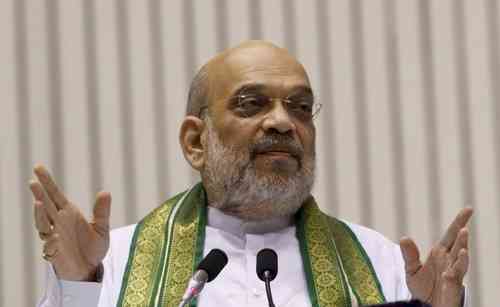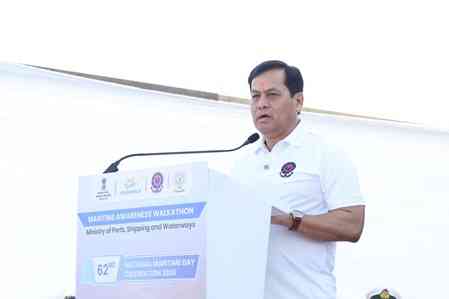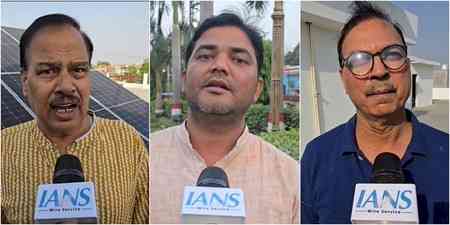Amit Shah asks investigative agencies to adopt 'ruthless approach' to destroy terrorism
Union Home and Cooperation Minister Amit Shah on Thursday inaugurated the two-day '3rd Anti-Terror Conference' organised by the NIA and said that all anti-terror agencies will have to adopt a ruthless approach so that no new terrorist organisation can be formed in the country.

New Delhi, Oct 05 (IANS) Union Home and Cooperation Minister Amit Shah on Thursday inaugurated the two-day '3rd Anti-Terror Conference' organised by the NIA and said that all anti-terror agencies will have to adopt a ruthless approach so that no new terrorist organisation can be formed in the country.
Besides Shah, Union Minister of State for Home, Nisith Pramanik, the Union Home Secretary, the Director of IB and the Director General of the NIA, including the Director General of the Central Armed Police Forces, Director General of Police of States, senior officials of the Centre and states participated in the meet. The Home Minister presented medals for excellent service to NIA officers.
In his inaugural address, Shah said, “Under the leadership of Prime Minister Narendra Modi, the central and state agencies have succeeded in firmly curbing all forms of terrorism in the country in the last nine years.”
He said that a model anti-terrorism structure should be formed in the country under the aegis of the NIA and the hierarchy, structure and SoPs of investigation of anti-terror agencies should be the same in all the states, so that there can be better coordination between the central and state agencies.
“All anti-terror agencies will have to adopt such a ruthless approach that no new terrorist organisation can be formed in the country,” the Minister said.
Shah said that the job of the NIA, ATS and STF was not just to investigate, but they should go beyond the scope of investigation and work towards attacking terrorism with out-of-the-box thinking.
He said that in the fight against terrorism, internationally, in the villages and in the states of India, there is a need to work with cooperation.
Shah also said that the Modi government has taken a tough stance on all challenges like crypto, hawala, terror-funding, organised crime syndicates, narco-terror links, which has yielded very good results, but a lot remains to be done still.
He said that to deal with terrorism, the Centre and the states, their agencies and inter-agency cooperation will have to think in vertical and horizontal ways.
The Minister said that the Modi government had prepared many database verticals in the last five years. Shah stressed that all the agencies of the Centre and the states should make multidimensional and Artificial Intelligence-based use of them, only then would India be successful in the fight against terrorism. He also said that the database should be used for investigation, prosecution, prevention and action.
He also urged every police station as well as police officers to make maximum use of the database.
He also pointed out that the inter-operable criminal justice system CCTNS had been implemented in 99.93 per cent i.e. 16,733 police stations and 22,000 courts have been connected to e-Court.
Data of about two crore prisoners was available through e-Prison, and more than 1 crore through e-Prosecution and data of more than 17 lakh from e-Forensics was also available.
Similarly, the National Automated Fingerprint Identification System (NAFIS) has more than 90 lakh fingerprint records and under the Integrated Monitoring of Terrorism (i-MoT), data of 22,000 terrorist cases was available for monitoring under the UAPA-registered cases.
He also asserted that there should be a common training module for all central and state-level counter-terrorism agencies, so that uniformity can be brought in the methodology of fighting against terrorism. He asked the NIA and the IB to take initiatives in this direction.
He said that the number of terrorist incidents in 2001 was 6,000, which the Modi government worked to reduce and it came down to 900 in 2022.
He praised the NIA for achieving a more than 94 per cent conviction rate and said more work was needed in this direction and asked all states to take steps to increase the conviction rate.
The Minister also said that with the cooperation of the central and state governments, major successes have been achieved in the fight against drugs.
“These achievements include the NCB-led Operation Samudragupta this year, during which approximately 2,500 kg of methamphetamine worth over Rs 12,000 crore was seized in Kerala. Apart from this, 10 lakh kilograms of drugs have also been disposed of,” he said.


 IANS
IANS 








